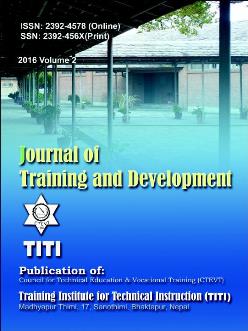Curriculum Issues in Nepal: A Study on Graduates' Perception
DOI:
https://doi.org/10.3126/jtd.v2i0.15439Keywords:
technical education, graduates, curriculum and labour marketAbstract
The study was carried to explore the perception of graduates of mechanical engineering of Technical School Leaving Certificate (TSLC) level perceive about their curriculum after they have entered the job market. The paper is a case study of Balaju School of Science and Technology (BSET) under the Council for Technical Education and Vocational Training (CTEVT) - Nepal in which semi-structured interviews of five graduates were conducted. The empirical research has been confined to exploring the perceptions of TSLC: pre-SLC intake graduates of mechanical trade and working inside Nepal. The study has brought forth that the graduates perceive their curriculum positively as the contents were relevant to the job market and the image of their institute was strong; and but they perceive the curriculum negatively since quite a few modules having high demand in the labour market lacked adequate practice, and a few contents were not updated. Besides, poorly managed infrastructure which was not up-to-date and the lack of professional attitude in the instructors impelled them to perceive their curriculum as less effective. On the other hand, the paper also showed the labour market exploiting the graduates despite the curriculum being market focused and graduates being skilful. The paper provides a thorough perspective of such graduates that may serve as a guideline for curriculum developers to address the identified issues. It also opens up the doors for further research to explore the issues in other technical subjects as well as vocational training programmes.Downloads
Download data is not yet available.
Abstract
1155
PDF
1348
Downloads
Published
2016-08-11
How to Cite
Bhurtel, A. (2016). Curriculum Issues in Nepal: A Study on Graduates’ Perception. Journal of Training and Development, 2, 57–68. https://doi.org/10.3126/jtd.v2i0.15439
Issue
Section
Articles
License
Authors who publish with this journal agree to the following terms:
- Authors retain copyright and grant the journal right of first publication with the work simultaneously licensed under a Creative Commons Attribution License that allows others to share the work with an acknowledgement of the work's authorship and initial publication in this journal.
- Authors are able to enter into separate, additional contractual arrangements for the non-exclusive distribution of the journal's published version of the work (e.g., post it to an institutional repository or publish it in a book), with an acknowledgement of its initial publication in this journal.
- Authors are permitted and encouraged to post their work online (e.g., in institutional repositories or on their website) prior to and during the submission process, as it can lead to productive exchanges, as well as earlier and greater citation of published work (See The Effect of Open Access).




